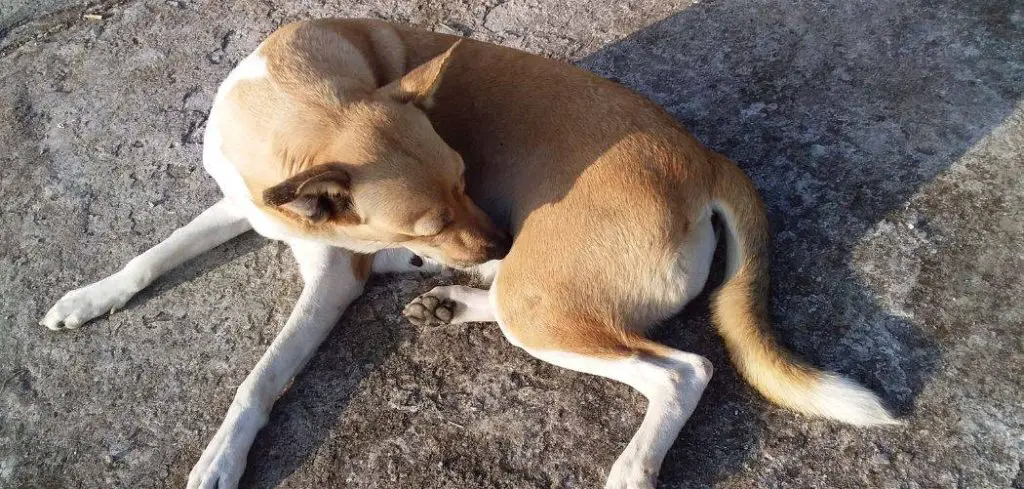A dog constantly licking its anus can be alarming and uncomfortable to witness. While occasional licking is normal grooming behavior, excessive or obsessive licking often signals an underlying health issue that needs attention.
We outline the common reasons why dogs constantly lick their anus, what you can do at home, and when to seek veterinary help.
Dog Constantly Licking Anus — Why It Happens
When a dog persistently licks its anus, it is usually due to irritation, discomfort, or pain. Common causes include anal gland problems, parasites like worms, skin allergies, infections, or even growths around the rectal area.
Some dogs may also lick excessively after diarrhea or due to irritation from grooming products or environmental allergens.
Since this behavior is tied to discomfort, it’s important for owners to investigate promptly.

Dog Constantly Licking Anus: Common Causes
Anal Gland Issues
Dogs have two anal glands located on either side of the anus. These glands can become impacted, infected, or abscessed, leading to irritation and discomfort.
A dog with anal gland problems may scoot its bottom on the floor, strain during bowel movements, or show swelling around the anus. Constant licking is often the first noticeable sign.
Untreated anal gland infections can worsen and cause severe pain, so prompt attention is important.
Read more: Dog Constantly Licking Me (When it’s normal vs. when to worry)
Worm Infestation
Parasites such as tapeworms and roundworms often cause itching and irritation around the anus. Dogs may lick excessively to try to relieve the discomfort.
Other signs include visible worms or egg segments in the stool, scooting, diarrhea, or unexplained weight loss. Since worms are contagious and can pose risks to humans as well, veterinary care and deworming are crucial.
Allergies
Food allergies and environmental allergens (like pollen, dust, or cleaning chemicals) can cause skin irritation, including around the anal area. Dogs may lick to soothe the itchiness, sometimes to the point of redness or hair loss.
You may also notice excessive paw licking, ear infections, or general skin irritation in allergic dogs. Identifying and managing the allergy source is key to stopping the behavior.
Infections or Dermatitis
Bacterial or yeast infections around the anus can create itching, burning, and discomfort that drive constant licking. Moist dermatitis (hot spots) may also develop if the area becomes inflamed and irritated.
Owners may notice foul odor, discharge, or swelling around the anal region. Left untreated, infections can spread and worsen, making early veterinary care necessary.
Rectal Growths or Tumors
In some cases, constant licking may be triggered by abnormal growths such as polyps, cysts, or tumors near the anus. These can interfere with normal bowel movements and cause irritation.
While less common, these conditions should always be considered, especially in older dogs. Veterinary evaluation and diagnostic testing help rule out serious underlying disease.
Post-Diarrhea Irritation
Dogs with recent diarrhea may experience irritation around the anus due to frequent wiping or acidic stools. This can lead to licking as a way to soothe the discomfort.
While mild irritation often clears quickly, persistent licking after diarrhea may indicate additional issues such as infection or parasites that need attention.
What to Do If Your Dog Is Constantly Licking Anus
If your dog is constantly licking its anus, start by gently checking the area for redness, swelling, or discharge. Keeping the area clean with a mild, pet-safe wipe can provide temporary relief.
Make sure your dog is up to date on deworming treatments, especially if parasites are suspected. Switching to a high-fiber diet may also help express anal glands more naturally.
For dogs with suspected allergies, reducing exposure to environmental triggers or adjusting diet with veterinary guidance may reduce symptoms. An Elizabethan collar (cone) may be necessary to prevent further self-trauma until the issue is resolved.
Always monitor whether the behavior improves or worsens, as persistent licking usually requires professional treatment.
When to Call or Visit Your Vet
If licking continues for more than a day or two, veterinary evaluation is recommended. Constant licking indicates ongoing discomfort that likely needs medical treatment.
Call your vet immediately if you notice swelling, bleeding, pus, a foul odor, scooting, visible worms, or difficulty passing stool. These signs often signal infection, impacted anal glands, or parasites that require prompt intervention.
Dogs that develop sudden pain, cry when trying to defecate, or have visible lumps near the anus should be seen urgently to rule out tumors or abscesses.
Read more: Dog Constantly Whining (What your dog is trying to tell you)
Key Takeaway
A dog constantly licking its anus is not just a grooming habit—it’s usually a sign of irritation, discomfort, or illness. Common causes include anal gland issues, worms, allergies, infections, or even tumors.
While gentle cleaning and monitoring may help in mild cases, most dogs need veterinary care to address the underlying cause. Paying attention to this behavior early helps prevent serious complications and ensures your dog stays comfortable and healthy.
